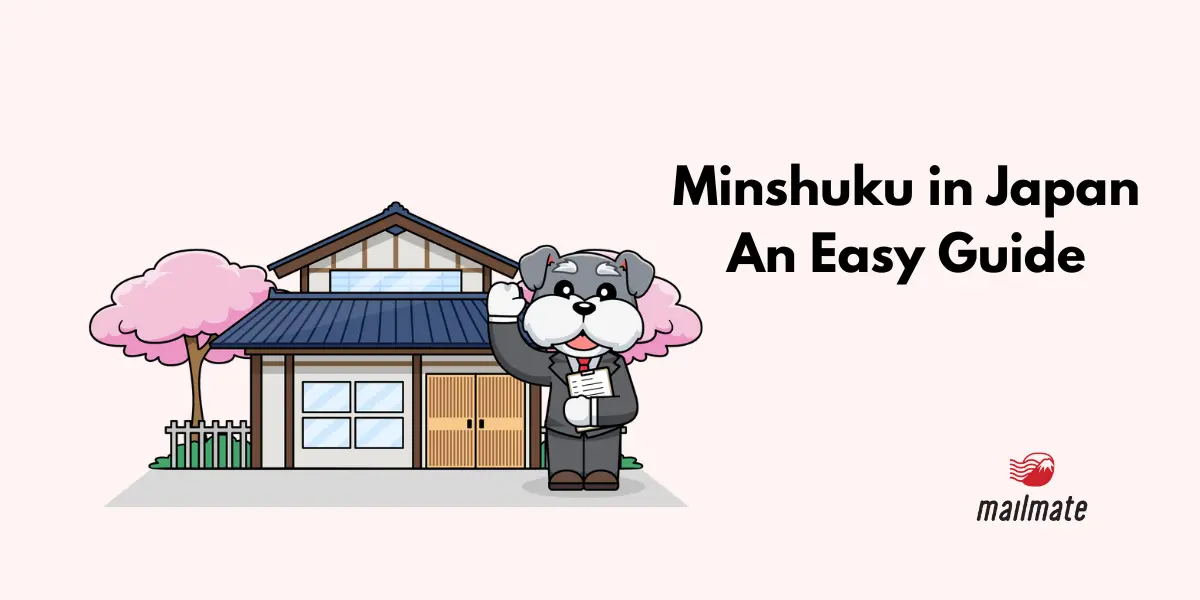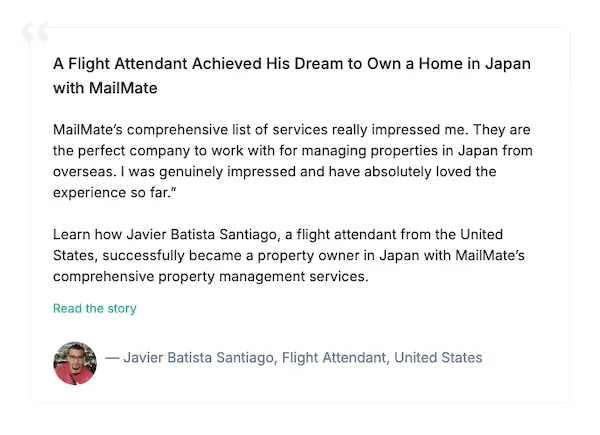Minshuku in Japan: A Comprehensive Guide for Property Owners

Are you interested in starting a small hotel business in Japan?
Japan has many rules and restrictions regarding small hotels and property rentals. For non-Japanese speakers, navigating these requirements can be challenging due to language barriers.
In this article, we will explain the laws, registration process, and licensing requirements for starting a minshuku (民宿) business.
Understanding minshuku vs. minpaku
Before diving into the rules and restrictions of minshuku, it is important to understand the difference between minshuku (民宿) and minpaku (民泊).
What is minshuku?
Minshuku (民宿) refers to a small Japanese-style inn (or Bed and Breakfast), similar to a ryokan (旅館) but on a much smaller scale, more affordable, and less formal. It is a type of accommodation that does not fit the definition of a hotel or ryokan (旅館).
Due to its characteristics, minshuku (民宿) are typically individually run and located in rural or tourist-friendly areas such as Hakone, Takayama, and Hokkaido.
Minshuku caters to many travelers looking for an authentic stay in Japan. Minshuku chikatsuyu in Wakayama is a great example if you are interested in starting a minshuku business in Japan.
What’s the difference between minshuku and minpaku?
Minshuku (民宿) generally have their own accommodation facility and provide meals to guests, whereas minpaku (民泊) generally provides part of a house or apartment as accommodation.
|
Minshuku (民宿) |
Minpaku (民泊) |
Regulation |
Operates under Hotel Business Act (旅館業法) |
Regulated under New Private Lodging Law (民泊新法) |
Property Type |
Traditional Japanese-style inn (or Bed and Breakfast) |
Private residences rented for short-term stays |
Owner Presence |
Typically owner-occupied or managed by someone on-site (varies by local regulations) |
Can be owner-absent |
Guest Duration |
No restriction on stay duration |
Max 180 days per year |
Licensing |
Requires a Hotel Business License (旅館業許可) |
Requires Private Lodging Business Certificate (住宅宿泊事業届出) |
Facilities |
Often include meals and communal spaces |
Usually self-catering with no food service |
Example Platforms |
Booking.com, Rakuten Travel |
Airbnb, Vrbo |
👉 Read Minpaku in Japan: An Easy Guide for Property Owners to learn more about minpaku!
How to legally operate a minshuku in Japan
So, what are the licenses and requirements to start a minshuku business? Here’s the step-by-step process for how to start minshuku in Japan.
List of required licenses
You will need the following licenses to start minshuku in Japan.
License Name |
About |
Submit to |
Hotel Business License (旅館業許可) |
For Operating Minshuku |
Prefecture or Public Health Center |
Restaurant Business License (飲食店営業許可) |
For Providing Meals |
Public Health Center |
Alcohol Serving License (深夜酒類飲食店営業) |
For Providing Alcohol at a bar past midnight |
Tax Office |
👉Note: If alcohol is only being served with meals (e.g., guest drinking sake at dinner), you do not need a separate alcohol license. The Restaurant Business License (飲食店営業許可) and property tax registration are enough. However, some local governments might require a separate alcohol license depending on how your minshuku operates, so it is important to check with the local office.
Requirements for getting a Hotel Business License (旅館業許可)
To obtain a Hotel Business License, the facility must meet the required standards to ensure the safety and comfort of the customers.
Facility Standard: Size of guest rooms and shared spaces, ventilation, number of bathrooms, etc.
Hygiene Management: Cleaning plans and disinfection equipment
Fire Hazard Equipment: Fire alarms, Fire extinguishers, and securing evacuation routes
👉Note: Hotel business license has 3 different categories.
If the facility has more than 5 guest rooms, the facility needs to be registered under the Hotel / Ryokan category.
If the facility has less than 5 guest rooms or hostel type, the facility needs to be registered under the Simple Lodging Facility (簡易宿泊所) category. Minshuku usually falls under this category, but it highly depends on the type and structure of the facility.
If the facility is a dormitory-style accommodation and operates for stays longer than a month, the facility needs to be registered under the Boarding House (下宿) category.
Steps for getting a Hotel Business License (旅館業許可)
Preliminary consultation at a local government office (Public health center, Building Inspection Department, and Fire Department)
Check the requirements for each permit
Prepare the necessary documents (application form, blueprint, equipment specification, etc.)
Submit to the office (prefecture, health center, fire department, etc.)
On-site inspection and review
Final approval & license issuance
👉Note: You must obtain approval from the local fire department to meet fire safety requirements and have a fire safety inspection before opening. Additionally, your minshuku must comply with building codes (建築基準法) and city planning laws (都市計画法) since some areas are prohibited for minshuku operation.
Read also: Home Inspection in Japan: Laws, Costs, and Benefits
Required documents and costs for different types of licenses
License Name |
Required Documents |
Cost |
Hotel Business License (旅館業許可) |
Application form, Declaration form, Blueprint within a map of a 300-meter radius, Layout plan, Piping diagram, article of incorporation and business registration (in case of a corporation), Application fee, etc. |
¥10,000〜¥30,000 (Depending on the accommodation category and the local government) |
Restaurant Business License (飲食店営業許可) |
Application form, Overview of a business facility, Blueprint, Layout plan, Water quality test report, Proof of food hygiene manager (certificate of a food hygiene course), article of incorporation and business registration (in case of a corporation), Application fee, etc. |
¥16,000〜¥30,000 (Depending on the local government) |
👉Note: There are additional permits depending on location and local government, such as a waste disposal permit (廃棄物処理法) if managing waste independently and a signage permit (屋外広告物許可) if you put up a sign outside. It is highly recommended to check these additional permits at a local government office.
Steps to start a minshuku in Japan
Choose the right license for your business (Minpaku Private Lodging Business Certificate vs. Hotel Business License) 👉If you want a Hotel Business License, check to see if your business falls under Hotel/Ryokan, Simple Lodging Facility, or Boarding house.
Check local zoning rules to make sure the property is eligible for business.
Apply for Fire Safety Certification with the local fire department.
Obtain the necessary business licenses.
Register your business with the tax office.
Prepare the facility to meet safety and comfortable accommodation standards.
Get inspected and approved by health, fire, and local authorities.
Start operations and comply with reporting requirements.
📌Tip: If you have any questions, it is highly recommended to visit your local offices with detailed documents and plans about your minshuku business.
Frequently asked questions
What is a minshuku?
Minshuku is a small Japanese-style inn or B&B and it is usually a family-run accommodation often located in rural or tourist-friendly areas.
What is the difference between minpaku and minshuku?
Minshuku is a small Japanese-style inn or B&B with its own facilities. It is regulated under the Hotel Business Act (旅館業法). Minpaku is a private residence rented for short-term stays. It is regulated under the New Private Lodging Law (民泊新法).
What is the difference between ryokan and minshuku?
Minshuku is a small Japanese-style inn or B&B, and it is usually a family-run accommodation often located in rural or tourist-friendly areas. Ryokan is a formal Japanese-style hotel and the size is usually larger than minshuku.
What licenses are required to operate a minshuku in Japan?
To legally operate a minshuku, you will at least need a Hotel Business License (旅館業許可) and Restaurant Business License (飲食店営業許可) if you serve meals to guests.
How do I know which license to get?
Choose the minpaku certificate if you want to rent out a private property for short-term and only operate for less than 180 days per year. Choose the Hotel Business License (Hotel/Ryokan) if you want to operate an accommodation facility that has more than 5 guest rooms. Choose the Hotel Business License (Simple Lodging Facility) if you want to operate an accommodation facility that is small and less formal than a Hotel/Ryokan such as a guesthouse. Pick the Hotel Business License (Boarding House) if you want to start a dormitory.
Do I need an alcohol license to serve drinks with meals at a minshuku?
No. If alcohol is served only with meals (e.g., sake with dinner), you typically do not need a separate alcohol license. The Restaurant Business License is usually enough. However local regulations may require a separate alcohol license, so it's best to check with the local office.
How do I apply for a Hotel Business License in Japan?
Consult with local authorities.
Prepare the necessary documents.
Submit your documents for inspection and approval.
Receive final approval and license issuance.
In closing
Investing in minshuku properties in Japan can be challenging for non-Japanese speakers. Understanding the legal requirements before starting your business is crucial. To ensure you have all the important information, check the Inns and Hotels Act. For more information about Minpaku private lodging, check the Portal Website for Private Lodging.
For property owners living abroad, consider simplifying your real estate investment with MailMate.
MailMate can be your property partner in Japan to streamline your property investment! Here’s a quick rundown of MailMate’s services:
Virtual Mailbox—Receive, scan, and forward Japanese mail worldwide
Bill Payments—Utilities, taxes, and other expenses managed for you
Utility Set-Up & Liaison—For Gas, Water, and Electricity
Tax Representative—Required for non-resident property owners
Domestic Contact—Official point of contact for property owners
Home & Disaster Insurance—Get a home & Disaster insurance quote for your property and manage payments with MailMate
Founded in 2019, MailMate has simplified property ownership for foreigners living abroad and is an increasingly popular option recommended by users and well-known industry figures.

Read more about real estate investment in Japan:
Spending too long figuring out your Japanese mail?
Virtual mail + translation services start at 3800 per month. 30-day money-back guarantee.

